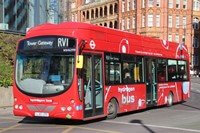
Hydrogen fuel cell, hybrid and electric buses – with biogas to follow, as city council reveals its preferred routes for cleaner air focus
Birmingham is embracing multiple ‘green’ technologies for the city’s bus fleet as it seeks to clean up the air quality – the City Council (BCC) has told CBW.
The news comes after CBW probed the joint award to BCC and Transport for London (TfL) of £2.8m for 42 hydrogen fuel cell buses in last week’s OLEV (Office for Low Emission Vehicles) announcement. The latter also included £3m for 10 hybrid and 19 electric buses, and electric charging facilities for National Express West Midlands (NXWM).
Asked to explain the reasons for the joint bid, Anne Shaw, Assistant Director – Transportation and Connectivity at BCC replied: “We’ve been working with Aberdeen, London and other European cities. The key thing about hydrogen buses is their capital cost and the required infrastructure investment. Therefore, we want to work at scale, with the aim of reducing costs. The first generation of hydrogen buses are operating in Aberdeen and London. We have been working on the project with a London-based organisation called Element Energy.
“Through that consortium, we’ve developed the 100 Bus Project. Between the three cities, we’re looking at procuring 100 buses and to bring procurement costs to below €650,000 per bus. That’s around £460,000 each – but diesel buses cost circa £170,000 each. While there is still a significant difference, we hope to reduce the gap as the project progresses.
“We recognise the cost is still high, but between the three of us, we’ve sourced OLEV funding, which is £67,000 towards the cost of each bus. It is hoped the remainder will be a combination of European Union and Local Growth Fund.
“It’s great the Government is supporting us, but we are awaiting the results of our bids. Therefore, by the end of this year, we’ll know the position. We are anticipating it will all come together. We’ve been working on this project for 18 months. The best way forward is collaboration – the key is economies of scale.”
Turning to Birmingham itself, Anne said: “We’ve created the Birmingham Blue Print, which is a strategy that maps out how the city can deliver its zero-emission zero and low-emission refuelling infrastructure, together with the corresponding vehicles. That was the starting point.
“As one of the cities to be a Clean Air Zone (CAZ), we’re looking at how to hasten the transition to ultra-low emission buses. We’re looking at other heavy diesel users too – including taxis and HGVs.
“On buses, we’ve been working with the region’s transport body, Transport for West Midlands and its largest bus operator, NXWM.”
Asked why hydrogen has been chosen in preference to electric traction, Anne replied: “In terms of operational flexibility, hydrogen is on par with diesel. It takes more or less the same time to refuel a hydrogen bus as it does a diesel bus, but the range is greater. Electric buses are fine within a city centre, but they don’t have the same range. They also
require overnight charging at depots – and that can mean reduced flexibility for operators. Hydrogen buses don’t have to have dedicated bays in depots – they’re the same as operating diesel buses in that respect.”
As for which corridor(s) hydrogen buses are likely to operate along, Anne said: “ We’ve not procured the buses yet, but if we get single-deckers, they will go on the 37 Solihull and Birmingham, via Acocks Green. If they’re double-deckers, they’ll go on the 16 between the city centre and Hamstead, Hockley. Double-decker hydrogen buses have only recently become a possibility. Those routes have been selected because they pass through the areas with the worst air quality.”
Asked why hydrogen has been selected in preference to biogas, Anne said: “With hydrogen, it’s zero emission, but with biogas there is still some carbon content. Gas buses have zero NOx emissions though. Infrastructure is required for biomethane too. Birmingham is currently sorting out its waste infrastructure. We will get there for biogas. We plan to have other routes which do run on biogas. We’re currently working with bus operators on that. We do have a gas infrastructure in Birmingham. In fact, we’re developing the UK’s first multi-fuel filling station the in the suburb of Tyseley.
“Hydrogen is about us prioritising zero-emission most quickly. The CAZ will be in place by 2020. We anticipate hydrogen buses being operational by 2018.”
Anne concluded: “It is great that our efforts to work in partnership with transport operators to make Birmingham’s air cleaner are being backed by the Government. We’re working on a wide range of projects to develop cleaner technologies and solutions to address air quality issues – this funding will help place the city at the forefront of what is being done. As well as tackling one of society’s biggest public health challenges, this programme of research and development will open up employment and business opportunities for Birmingham.”
As for London’s part in the hydrogen project, TfL told CBW: “It’s too early to say yet what route(s) the OLEV money will be used to part-fund. Once the outcome of the remaining funding bids has been announced, a report will be prepared for discussion by the TfL board.”
INFO
Read more about BCC’s plans at: www.makingbirminghamgreener.com/2015/blueprint/

